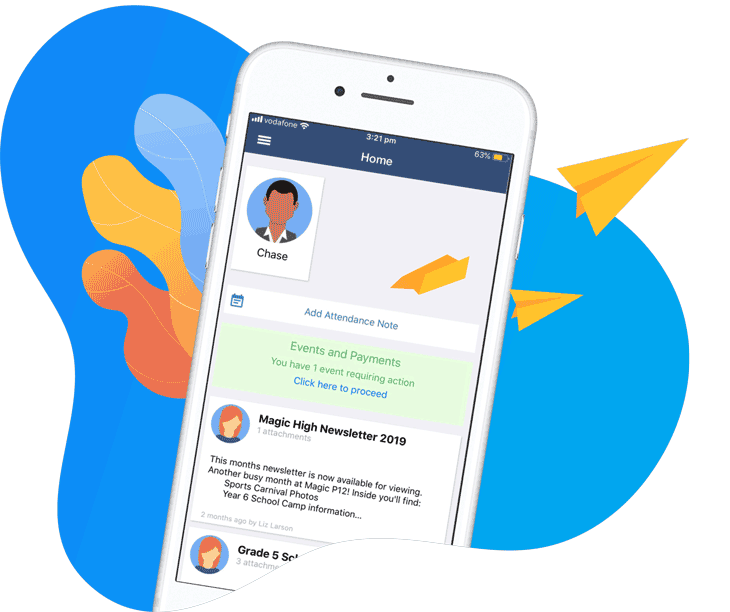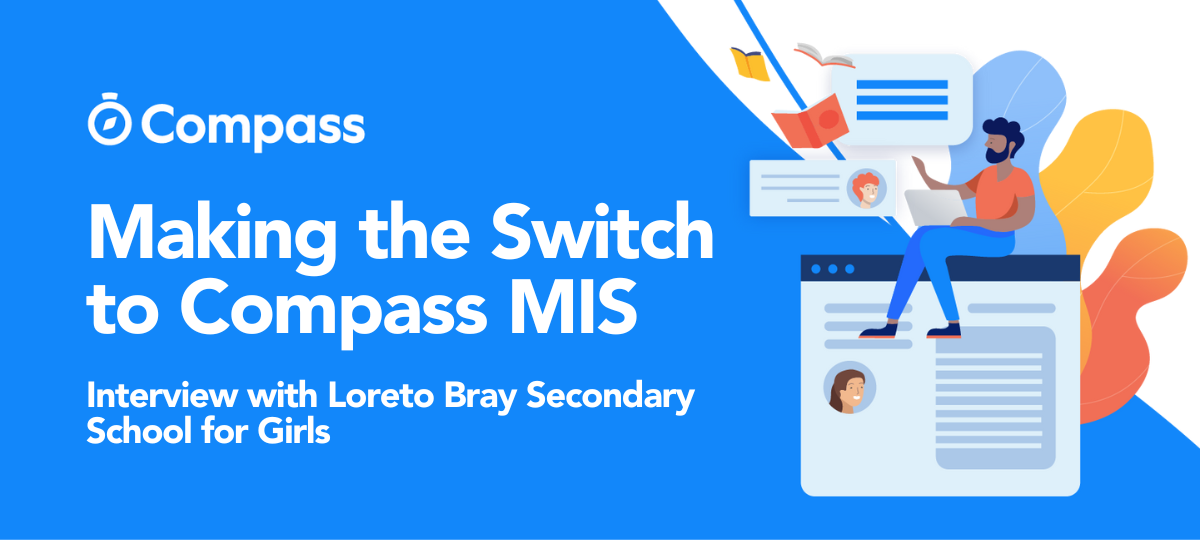For context, Loreto Bray is a large comprehensive Girl’s secondary school with over 700 students. Since our Ireland launch in 2016, Compass has over 70 schools. Compass Ireland, like UK and Australia, focus heavily on creating a community of schools who can speak to, meet with and learn from each other – in and out of the MIS software we provide.
This case study interview has been broken into two parts, focusing on why they switched and how their experience with our team. With the second part focusing on why schools love Compass and the features that have made the lives of the staff at Loreto Bray easier, which you can read here.
We spoke with Deputy Principals Frances Ward & Dee Ryan on their experience moving to Compass. Frances had used Compass at her previous school from a teaching perspective.
Francis Ward: [My previous school] was in fact one of the pilot schools for Compass in Ireland. So I had used Compass for many years and I knew the benefits of it. So when I came to Loretto Bray 18 months ago, they weren’t using Compass. And I asked “Why aren’t you using Compass? This is nuts!”. The previous system that we had in Loreto Bray, for me anyway, wasn’t fit for purpose and I became very frustrated with it. [I told our principal] We have to change.
How did Loreto Bray instigate the switch?
Francis Ward: We got a team of teachers together and started to look at Compass specifically. The school that I came from would’ve been hugely helpful in, you know, assisting us in making that decision. And then obviously in the initial rollout of Compass, I got great support, not only from Compass, but from the school that I had been working in previously. So that was really, I suppose the, the instigator for, for changing the system here. Now having said that the teachers weren’t happy either with the system that was in place, they were frustrated by it as well. And then I suppose word gets around, you know, other schools that had been using Compass, were saying “You’re mad! You should really go with [Compass]”. Just looking at the benefits and how it can make life so much easier from a teacher’s perspective, from a parent’s perspective, and certainly from senior management and admin perspective as well.
Dee Ryan: I came from another school that used the same system as had been here previously before Compass, and was familiar with that. I suppose the pandemic brought together home and school in a way that had never happened before. And our old system was reliant on those two things as being very, very separate. When in actuality those things, we learned, are really not separate at all. So we needed something new. And then Francis had had experience with Compass and how user friendly it was.
Because everybody, students, teachers, staff, parents, everybody had to up-skill so quickly. And [Compass] is just so much more user friendly. Everything is so much clearer and much more accessible.
It’s no secret that changing MIS is a big and sometimes scary task, how did your school mitigate fear of change?
Dee Ryan: Even though we did up-skill, I suppose the fear was gone out of it a little bit for people who might have been a bit scared of technology. The interface is much nicer for them, so they’re less afraid to click on something as they don’t think they’re gonna break the internet. But at the same time it’s all laid out in front of them, so they kind of feel, okay, I can access this, I can access that. When we got Compass, it merged much better with school we have become in the last three years, which has been expedited hugely by the pandemic I think.
How has your experience been with the support and training team?
Frances Ward: I think that was one of the biggest draws for us was the support that you got. It’s just been incredible. My big fear is that as Compass gets bigger and bigger, I won’t have access to Laura and Owen who are just fabulous. But that makes a huge difference. You know you can sound silly, and then when Laura tells you how to do it, you think, “Oh of course. I should have known how to do that”. But you never feel like that. They go through it so simply, so quickly. And nothing is a problem. Like, I ring or email Laura for regular help and she’s always back straight away.
When we were doing that initial changeover, it was really, really brilliant. It was great to have that support from Compass. And even just the events that Compass organise during the year. It’s great to meet other schools! At the last event we were at in the Guinness Storehouse, I was talking to another school in Dublin about how they were using the events feature, they had gone to another level with it that I wasn’t even aware of! It was great to get that presentation and to see where we could move with it. So I know myself that while we’re using Compass, we’re not using it to its full capacity just yet because we’ve only introduced it in the last year. So I’m really looking forward to and excited about just improving on it all the time and to look at all of the other features and to start using them a little bit more. But I could not fault the support that Compass has offered. It is really a unique selling point that Compass has.
Dee Ryan: I would agree. I wasn’t here for the initial rollout, so I came late to the party, but it really is so user friendly. So when I came back I just played around with it, basically. Clicking on things and finding out what happens “can I do this, and can I do that, and what’s in that dropdown menu?” And then Laura basically gave me a day and was like, “what do you need?” And she came to the school and I was like, “oh, I just, I’ve gotten this far, but I need to know that now.” Because loads of stuff was up and running, so I just kind of had to have a crash course when I came back. And so she gave me all of the next little bits that weren’t initially obvious, from my kind of initial interactions with it. Usually I go to Francis and then Francis has the direct line.
“Francis, how do you do this?” She goes, “oh, I’ll find out.”
Frances Ward: It was great at the beginning of the year because our school has a positive behaviour structure rather than like a discipline structure, but just to use that umbrella term. So we do positive behaviour points. So Laura customised our Chronicles* for that, which was really brilliant. So there was very little change, we didn’t have to change the language of what we were currently using. Now, I suppose the, the only words that we’re now like using is “Chronical” – “have you put a Chronical entry in there?”, you know, so it just shows you how adaptable both teachers and the students have been to Compass. And it Compass has made it easy to do that. You’re very much able to bring your processes with you.
Dee Ryan: Yeah, exactly. It’s adaptable like that.
*Chronicle is our wellbeing and behaviour module in Compass.
Let’s talk about the concept of being a “Compass School”. You mentioned our events, do you feel a sense of community being a Compass School?
Frances Ryan: Definitely! You’re right about the concept of a Compass school. Like we’re in a Loreto school and you have that Loreto community. And it’s all to do with the ethos, well, it’s to do with everything. But it’s exactly the same with Compass.
And it was great at those events to join up with other schools. As I said, the presentations that other teachers had given at those events in relation to different functions of Compass, they were just brilliant because you’re talking to people who are using it on the ground on a day-to-day basis. They’re at the same game that you are at.
And it was just great to have that ability to be able to chat to these people in such a lovely environment and just really, really friendly. It really makes a difference. And I know for [our principal], when we started to use parent-teacher meetings, she was in contact with another principal and the two of them were back and forth, back and forth. So between the two of them, both schools started to use the parent-teacher meetings through Compass. It is a really good, valuable community – and you learn from each other!
Final question, do you have any advice for a school wanting to join Compass?
Frances Ward: The first thing is do it. That is the first thing I would say. Like, it’s just a no-brainer. It really is! I’ve used a good few of the other systems, so it’s not that I’m completely biased, I just know the benefits of Compass. So that would be the first thing. I think the rollout of Compass was really, really smooth for us. But that was because of the support that we got from Owen and Laura. It really was. Now, I suppose I had a bit of an in because I knew what it was capable of. But again, I was coming from a teacher’s perspective, so I needed support then coming from a management perspective. But I think rolling it out is the easiest thing you will do.
And you will be surprised at how quickly teachers will take it on board. At first they’ll go like “oh God, this is another thing”, which I understand because we don’t like change. But then once they start using it, I mean teachers have come back to us and said, “oh my God, this is just brilliant”. And they are really excited by it. Certainly the year leaders, the form teachers, they’ve information at the tip of their fingers that before it was a real drag. And I’d say teachers probably dreaded seeing that they were a form teacher on their timetable or you know, if they had an AP one or an AP two post as year leader or year heads. But now it’s so easy and so quick to get that information and you can build up a really great rapport with your students because you know everything about them. Like you’ve a great profile on each child, all in the one area. So you’re not running around bits of paper here, bits of paper there. Everything is centralised for you. But definitely my advice for any school who’s thinking of joining Compass is just do it. You will not regret it. And I am not on commission.
Dee Ryan: I’m very happy with it as well. I’m less evangelical than Francis, but I haven’t had as much time to use it. The one thing that I think is really important about it is, it’s so visual. I like that because when I am learning, I always draw diagrams and I have to write things down to remember them. I’m a list woman, I have to see things in front of me to know things. So the visual aspect of Compass makes everything so much easier and that appeals to most people.
My piece of advice would be – clarity. If you were rolling it out to staff, before you even start to talk to people, you have to have a presentation or handouts or a system up and running that they can use to show them what it looks like.
Because straight away that’s the biggest selling point to me. I can literally look at something, a student or a class group or year group, and see basic information straight away because of the colour coding, the interface. That’s the most attractive thing about it. If you are going to roll it out, have the visual aspect prepped before you bring it to your staff.





